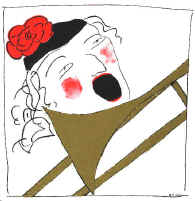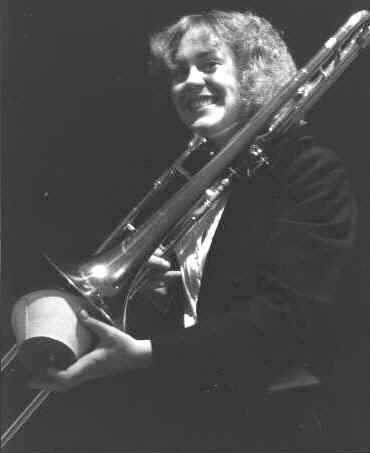|
Press from the media in the USA and Europe - "An utterly entertaining
evening… This fabulous Abbie
Conant… After seeing and hearing the
musician Abbie Conant, one gets an idea of what many actresses are painfully
lacking: namely, a musically schooled sensitivity to the pitch inflections
and flexibility of the voice, that allows her to present an astoundingly
varied rhythmic and expressive performance, and all with a natural ease one
seldom finds. […] An excellent, versatile, talented performance artist, and
an outstanding trombonist as well.” --Süddeutsche Zeitung, May 5, 1987
“...for
the doubting monolog of the blind cripple Hamm and the naive calmness of
Winnie, William Osborne has written a consistently appropriate music. It is never forced, but sensitively
supports the text with attention to emotion and atmosphere… In the end, thanks also to the impressive
performances, one was impressed and never bored for a minute.” --Münchner
Abendzeitung, September 29, 1987 “Abbie
Conant, otherwise solo trombonist of the Munich Philharmonic, embodies a
wrecklessly funny Winnie (from “’Happy Days’.) The way she rummages in her shopping bag, deciphers the print
on her tooth brush, continually quotes the ‘wonderful’ and ‘immortal’
classics, and always two centimeters this side of hysteria—this one should
really see and hear, and in English, one discovers the clown in Samuel
Beckett.” --Süddeutsche Zeitung ng, February 28, 1986 “…the
Wasteland Company’s unique work in a mixed form of acting and music, song and
instrumental performance has something of excitement to it. In this manner the trombonist Abbie Conant
contrasted her high musical professionalism with natural acting talent to
present a refreshingly spontaneous Winnie.” --Münchner Abend
Zeitung, Freburay 28, 1986 “Osborne’s
transcription of ‘Happy Days’ is an impressive 45 minute mini-opera for an
‘acting trombonist and piano-player.’ […] Through the musical
transcription and accompaniment, through the change between sung and spoken
passages, the musicality of the text is shown, and the structure of the theme
and variations underlined. The
fascinating text, brilliantly performed by Abbie Conant, is given a
completely new dimension in its content and the quality of its language.” --Götttinger
Tageblatt, April 29, 1986 “The
few words that are spoken in the scene (Rockaby) are memories of an old woman
played from a tape, which William Osborne has accompanied with tender
discretion and melancholic sympathy.
[…] It is a breathtaking work
in a continuous piano and awakens the wish to hear more of his works such as
‘Hamm’ for an acting violinist from ‘End Game’ or ‘Vladimir’ for acting bass
clarinetist from ‘Waiting for Godot.’ […] She [Abbie Conant] is a
multi-talent, she is a capable soprano, cackles and chatters the text in
theatrical escapades – plays short passages virtuosically on the
trombone. […] First on the program was ‘Winnie’, a no
less impressive work.” --Hessische
Allgemeine Zeitung, Kassel April 28, 1986 “The Opera Stabile [an opera studio
theater] remembers much too rarely the purpose for which it was originally
built: the presentation of chamber music theater. In this sense the guest performance of the Munich based
Wasteland Company was exactly appropriate.
[…] Abbie Conant is a genius
for character roll changes. In one
evening she plays the characters in Act Without Words, Winnie in Happy
Days, and the woman in the rocking chair in Beckett’s new work based on
the variation, Rockaby: three scenes of futility, self-betrayal, and
disintegration, bedded on a discrete piano accompaniment, that Osborne, with
the diction, structure, and stage directions of Beckett, uses to legitimize
his purpose. […] Abbie Conant portrays a ‘woman in her
fifties’ with bull’s eye accuracy, buried to the neck in the rubble of her
married years: a bulls eye. She
brings the social and personal situation of some fifty year olds directly to
the point: ‘Please love me.’” --Die Welt,
October 26, 1987 “Act
Without Words. A touching
seventeen minute long clown-like number of the acting trombonist Abbie
Conant… Suzanne Bradbury, the
excellent pianist, performed like a silent film of the old days. A Chaplinesque reminiscence, an
amusement. The second and central
part of the program was something different, a mini-opera after Becket’s Happy
Days. Once again Abbie Conant
captured the tone of this prattling (performed in the English original) woman
with maddening accuracy, some passages modulating from Sprechgesang to a high
shrill drive. The beginning appeared
as a music revue comedy but then one is captured by this performer, who also
can take up her instrument and with seeming effortlessness change back to the
use of her voice, the perfect completion to the sometimes forceful, sometimes
restrained piano music of William Osborne.
[…] The brilliance of the
evening: Abbie Conant’s strong presence, her impressive performance,
congenial presentation and recreation of the sensitively accompanied words of
Beckett by the music of William Osborne.” --Hamburger
Rundschau, October 10, 1987 “All
together 15 works of composers were performed, [Stuttgart New Music Festival)
that put the old music theater forms in question. Strictly speaking, however, only two works were impressive: the
dadaistic Adventures & Nouvelles Avetures from the year 1962, in
which György Ligeti makes fun of conventional opera and cultural
institutions, and the music theater work Miriam for trombonist/soprano
and piano by the American composer William Osborne, that was premiered by the
“Wasteland Company.” […] The work requires an actress that can
speak, sing, and play the tromnbone.
Abbie Conant fulfilled these requirements. Together with Leonore Hall she gave an impressive performance
that really gets under the skin.” --Mannheimer
Morgan, late November/early December, 1988 (date unknown) “On
the program were two deep psychological women’s portraits by William
Osborne… His ensemble, ‘The Wasteland
Company’ has an above average niveau.
The outstanding protagonists are Leonore Hall, a sensitive pianist
with highly refined touch, and Abbie Conant, a multi-talent for large solo
scenes, in which she must speak, sing, mime, and play the trombone. […]
Abbie Conant’s facial expressions were as gripping as the engaging
music, whose trombone tones warned of burial celebrations. With the uncommonly moving scene Osborne
has given back to music something it has long avoided: spirituality. Will the music theater of tomorrow follow
Osborne’s lead?” --Stuttgarter
Zeitung, November 30, 1988 “This
production of the ‘Wasteland Company’ was from one soul, the music was an
ideal marriage with the senic inventions and the performance of Miriam. The expressive music reminded one of the
early John Cage; the setting: computer controlled piano, piano and trombone,
voice. The performance of Abbie
Conant was absolutely striking, an all-round genius. --Applaus, June
1990 “Miriam
was played by Abbie Conant, solo-trombonist of the Munich Philharmonic (which
one noted from her excellent trombone playing), who is at the same time a
performer of utter intensity. As a
singing actress, or as an acting instrumentalist she practices an all
encompassing sort of performance art.
[…] Concentrated on psychological
proceedings, without clichés, but with moving visual imagery and professional
master, Miriam can still be seen today and tomorrow in the Opera
stabile.” --Hamburger
Abendblatt, November 15, 1990. “With
the premiered three act play William Osborne (music, book, direction) and
Abbie Conant (trombonist, actress, singer) have succeeded in creating a
forceful theatrical experience.” --Münchner
Merkur, May, 1990 “Abbie
Conant is a young woman who must be labeled as a multi-talent. She masters pantomime, voice, Sprechgesang
and trombone. In the woman’s portrait
Miriam she unifies her abilities to an anguishing study of a woman
seeking her identity. The staging of
the ‘Wasteland Company’ is notable experimental theater. Abbie Conant has the courage to go into
detail.” --Storniarner
Tageblatt, November 24/25, 1990 “The
performance artist Abbie Conant, accompanied on the piano by Leonore Hall,
presents expressive spiritual theater.
The public, through the outstanding acting and vocal abilities of
Abbie Conant, was drawn into a spell, expressively supported with the
trombone.” --Lübecker
Nachrichten, November 23, 1990 “The
content of the 40 minute theatrical scene was gruesome; the audience’s
reaction was ecstatic. […] Conant is in
equal measures a virtuoso trombonist, a compelling actress and a competent
opera singer… Miriam paints a
haunting portrait of a woman made invalid against her will. […]
The performer gets a break only when the tempo slows, but even then
there is no letting up in terms of intensity.” --St. Louis
Post-Dispatch, May 31, 1993 “…a
harrowing music theater piece…” --The Wall Street Journal, July 7, 1993
|

